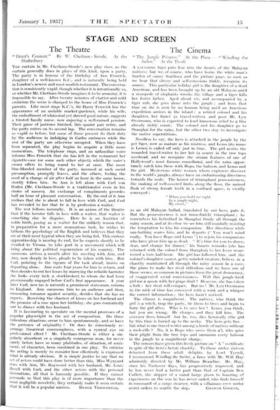STAGE AND SCREEN The Theatre
" Heart's Content." By W. Chetham - Strode. At the Shaftesbury
THE curtain in Mr. Chetham-Strode's new play rises, as the curtain generally does in plays of this kind, upon a party. The party is in honour of the birthday of Ann Fenwick, daughter of a well-known K.C., and is naturally being held in London's newest and most modish restaurant. The conversa- tion is consistently vapid, though whether it is intentionally so, or whether Mr. Chetham-Strode imagines it to be amusing, it is impossible to say. After twenty minutes of chatter and mild eroticism the scene is changed to the house of Miss Fenwick's parents. Like most stage K.C.'s, Sir Harry Fenwiek has the appearance of an amiable market-gardener, while his wife, the embodiment of whimsical yet shrewd good nature, suggests a trusted family nurse, now enjoying a well-earned pension.
Their game of patience finished, this quaint pair retire, and the party enters on its second lap. The conversation remains as vapid as before, but some of those present do their duty by the audience in indulging in Garbo embraces while the rest of the party are otherwise occupied. When they have been separated, the play begins to acquire a little more momentum. The telephone rings, and an unfamiliar voice informs Miss Fenwick that she has left in the restaurant her cigarette-case (or some such other object), which the voice's owner offers to bring round to her at once. The most blue-blooded member of the party, incensed at such social presumption, promptly leaves, and the others, feeling the need of a change of air after half an hour in the same house, shortly follow him. So Ann is left alone with Carl von Roden (Mr. Chetham-Strode is a traditionalist even in his choice of names). An exchange of compliments precedes half an hour of pleasant conversation. By the end of it Ann realises that she is about to fall in love with Carl, and Carl has revealed to her that he is by profession a waiter.
The rest follows naturally. It is an axiom of the theatre that if the heroine falls in love with a waiter, that waiter is something else in disguise. Here he is an Austrian of noble birth, posing as a waiter for the unlikely reason that, in preparation for a more momentous task, he wishes to fathom the psychology of the English and believes that they are at their most typical when they are being fed. This curious apprenticeship is nearing its end, for he expects shortly to be recalled to Vienna, to take part in a movement which will bring about the political regeneration of his country. The summons arrives a month after his meeting with Ann, and Ann, now deeply in love, pleads to be taken with him. But Carl, pointing to the rigours of the task ahead, insists on departing alone. Ann waits four years for him to return, and then decides to cut her losses by marrying the reliable barrister (he looks every inch a stockbroker) to whom she had been provisionally engaged before Carl's first appearance. A year later Carl, now as is natural) a prominent statesman, returns to England. Ann summons him to an audience and then, measuring romance against security, decides that she has no regrets. Receiving the chastest of kisses on her forehead and the promise of a rose upon her birthday, she goes contentedly out to dinner with her husband.
It is fascinating to speculate on the mental processes of a popular playwright in the act of composition. Do these ridiculous situations occur to him spontaneously, and so have the pretence of originality ? Or does he consciously re- arrange theatrical commonplaces, with a cynical eye on professional effect ? Mr. Chetham-Strode is either a sin- gularly absorbent or a singularly courageous man, for never surely before have so many platitudes, of situation, of senti- ment, of character, been combined in one play. To criticise the acting is merely to consider how effectively is expressed what is already obvious. It is simple justice to say that no set of actors could have done better than this. Miss Wynyard does with Ann, Mr. Raymond with her husband, Mr. Louis Boren with Carl, and the other actors with the personal decorations, all that is humanly possible. If they cannot persuade us that this play is of more importance than the most negligible novelette, they certainly make it seem certain that it will be a PoPular success. DEREK VERSCHOYLE.






































 Previous page
Previous page